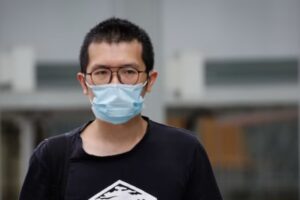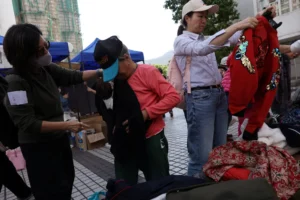
The struggle for a better life has long pushed many Chinese citizens to escape difficult conditions at home. In the most recent waves of emigration, tens of thousands of Chinese migrants have made perilous journeys through Central America along the “walking route,” or zǒuxiàn (走线), in an attempt to reach the southern U.S. border. But the political climate at their destination has become increasingly hostile, particularly under the new U.S. administration, which has deterred Chinese tech talent and restricted Chinese student visas (building on restrictive measures under the previous administration). Now, some Chinese migrants are reconsidering their escape routes and looking beyond America—or returning home.
The impetus to emigrate in recent years is encapsulated by the term “run” (润) or “runology” (润学). Recent CDT translations have illustrated how persistent youth unemployment, continual pandemic-era surveillance, and a repressive political environment, among other issues, have contributed to a feeling of malaise and a loss of faith in the Chinese Dream. Last week in the Made in China Journal, Dino Ge Zhang situated “runology” in the context of “Sinopessimism”, describing it among other negative affects and exit strategies for youth disenchanted with contemporary Chinese life. But the author hinted that the practice of runology ultimately may not yield desirable results, particularly for those who have chosen to flee to the U.S.:
‘Runology’ or runxue (润学, a neologism that literally means ‘studies’ of how to run away from China) is another systemic effort of coping: rationalising outbound migration as a solution to domestic issues within China. There is a GitHub page dedicated to the ‘comprehensive philosophy and methodologies’ of runxue (GitHub n.d.). While runxue certainly fits into hundreds of years of history of outmigration from China framed in narratives of hope, its latest manifestation can be seen as politically militant or at least pessimistic. The diagnosis provided by runxue arrived at a profound despair: hope is relegated to an imagined Outside that has ‘been founded upon different principles and operated under a different order’ (Ligotti 2008: 48).
In this sense, apart from being a practical guide to different pathways of (il)legal migration, runxue is not simply a negative, pessimist disavowal of one’s home country and the conventional life there, but also a positive, optimistic, or even utopian hope for a meaningful escape. For example, in the past three years, there were waves of undocumented Chinese migration into the United States from across Latin and Central America, often dubbed as zouxian (走线) or, literally, the ‘walking line/route’ (Dong 2022). It remains to be seen whether the hopes of this track of runology will survive Donald Trump’s second-term presidency and his executive orders for mass deportation.
To connect runxue to a case of literary misanthropy, the protagonist Ye Wenjie in Liu Cixin’s Three-Body Problem (2014) was so traumatised by the Cultural Revolution that she turned to the Outside of an unknown alien species as a better alternative. The deadlock of runxue is rooted in the ‘naivety’ of such hope: what if there were no such place on the Outside? Runology dwells on the same centuries-old presumption of the diasporic condition: will resigning from the conventional Chinese life (steeped in deeply rooted patriarchy, toxic kinship and workplaces, ordinary sexism, and so forth) guarantee a meaningful new life (Coates 2019)? Perhaps the terminal end of runology is not flight, but escaping further into the system (体制)—hence the nationwide craze for civil servant exams (Chen, L. 2024) or internal migration back to the rustbelt such as Hegang (Zhang and Tang 2024) or the idyllic countryside (Cai 2024). [Source]
Chinese migrants are increasingly questioning the benefits of escaping to the U.S. One individual who returned to China after migrating to Singapore wrote an article on NetEase in June highlighting the risks of moving to a foreign country (such as the U.S.) with the assumption that everything will be better than life at home in China: “If one day U.S.-China relations were to melt down, and you happened to be in the U.S., do you really think you’d remain unaffected, that you wouldn’t become a pariah? Or even worse, could you be certain that your life and property wouldn’t be jeopardized?”
For the roughly 390,000 undocumented Chinese migrants in the U.S., pressure is growing. In an article last month describing these changes, Initium Media wrote that WeChat groups once meant for sharing job opportunities among Chinese migrants in the U.S. have now switched to tracking activities of the U.S. Immigration and Customs Enforcement (ICE) agency, and that the owner of one such group disappeared and was likely taken away by ICE. The article mentioned that rumors of dire conditions in immigration detention centers have been circulating on Chinese social media, including news that one Chinese ICE detainee died by suicide in an Arizona detention facility in late March. Another Chinese ICE detainee also died by suicide in a detention facility in Pennslyvania last week. In June, ICE announced it had deported 122 undocumented Chinese migrants to China, after the Chinese government agreed in late January to repatriate confirmed Chinese nationals from the U.S. In February, Chinese and other Asian nationals without criminal records were even deported from the U.S. to Costa Rica. The cumulative effect of these changes has been a significant drop in the number of Chinese undocumented migrants encountered by ICE near the U.S. border: about 10,000 between February and July, compared to almost 38,000 during the same period last year.
Amid this upheaval, some Chinese migrants have expressed regret about their choice to come to the U.S. One man from Fujian who took the arduous walking route through Central America told the BBC last week, “America, to me, feels like it’s becoming another China. A Darwinian society,” adding, “If I had known what it would really be like, I might not have come.” The BBC article stated that this new wave of Chinese migrants “now feel themselves caught in a pincer: mistrusted by Americans, unwanted by Beijing, and sometimes suspended in legal limbo.” Reporting last week for The New York Times, Alicia Chen wrote about how a small number of Chinese migrants have voluntarily returned to China, amid broader discussions about “reverse runology”:
And dozens of videos of ICE arrests have circulated on Chinese social media, fueling fear among the community, [said Huang Xiaosheng, a Los Angeles-based Chinese immigration lawyer].
Some Chinese immigrants “are thinking about their Plan B,” Mr. Huang said. “They’re considering Canada or other countries, or even going back to China.”
[…] Recently, discussions on Chinese social media have centered around questions including “Should I go back?” or “Who has been back?” Users who have left the country often debate the pros and cons of their decisions. They once discussed “runology” — figuring out how to leave China during the lockdowns. Now, they discuss “reverse runology,” or mapping a way back to China.
Experts noted that, despite the online chatter, the number of voluntary returns appeared to be small. They predicted it would likely stay that way, given China’s faltering economy, soaring youth unemployment and stifling censorship that have continued to drive people out — plus any legal consequences of returning.
[…] Mr. Xu [Feng]’s two friends confirmed their return [to China] to The New York Times but declined to be interviewed. Both paid a fine of 1,000 Chinese yuan (about $140), and one’s passport was confiscated. [Source]
Beyond government immigration policies, a growing “new McCarthyism” in American society is further complicating life for Chinese migrants. In a NüVoices essay last month, Frances Zhu Hisgen, a self-described half-Chinese second-generation immigrant (and senior research program manager at the Hoover Institution), wrote that “being Chinese is now an occupational hazard.” She described how the dominant discourse in the U.S. is one in which “people like me and my family are dehumanized, reduced from individuals with ambitions and fragilities and flaws to pawns in a geopolitical game,” and which ignores “the ideals that attracted my family to this nation in the first place.” A Guardian article from March described how many Chinese migrant families in the U.S. are indeed now afraid to go to work. In an interview last month with Fabian Peltsch at Table Media, Wei Du, director of the award-winning documentary “Walk the Line,” emphasized work and children’s education as decisive factors in Chinese migrants’ decisions to stay in or leave the U.S., and described how their attitudes have evolved since their arrival:
What happened to your protagonists? Are they still in the US?
One of the younger young men actually went back to China. The rest all have open asylum cases. When they arrived, the courts were so backed up that their first hearing would be in two or three years. That gave them a bit of comfort.
Now, the timeline has sped up a bit, but none of them has received a final decision yet. While they wait, they can legally work. They’re trying to settle in, but of course, the current atmosphere in the US is not what they expected.
Do they want to stay in the United States despite the current hostility?
Definitely. They gave up so much to get here. And it’s not even clear what would happen if they were deported– some might not be safe going back. Families with kids are especially focused on settling. They work less, earn less, but their priority is getting their children educated and integrated into the community. [Source]
Back in China, the government is continuing to restrict outbound migration for certain citizens. The New York Times reported last week that more civil servants—such as teachers, nurses, doctors, and even government contractors and employees of state-owned enterprises—have been ordered to hand in their passports in order to enforce “discipline.” Some employees were told to report any overseas trips they had taken since 2018 and were refused overseas trips for “ordinary research, exchange and study.” A wave of similar measures swept China in the fall of 2024, as some public-sector employees were forced to turn in their passports amid national security concerns. Likewise, during the COVID-19 pandemic in 2022, the National Immigration Administration stated it would “strictly limit” unnecessary overseas travel by Chinese citizens, with border guards in Guangzhou clipping the passports of some arriving passengers. Meanwhile, Tibetans and Uyghurs have been systematically denied passports since at least 2013, and underwent other rounds of forced passport recalls in 2015, 2016, and 2017.





